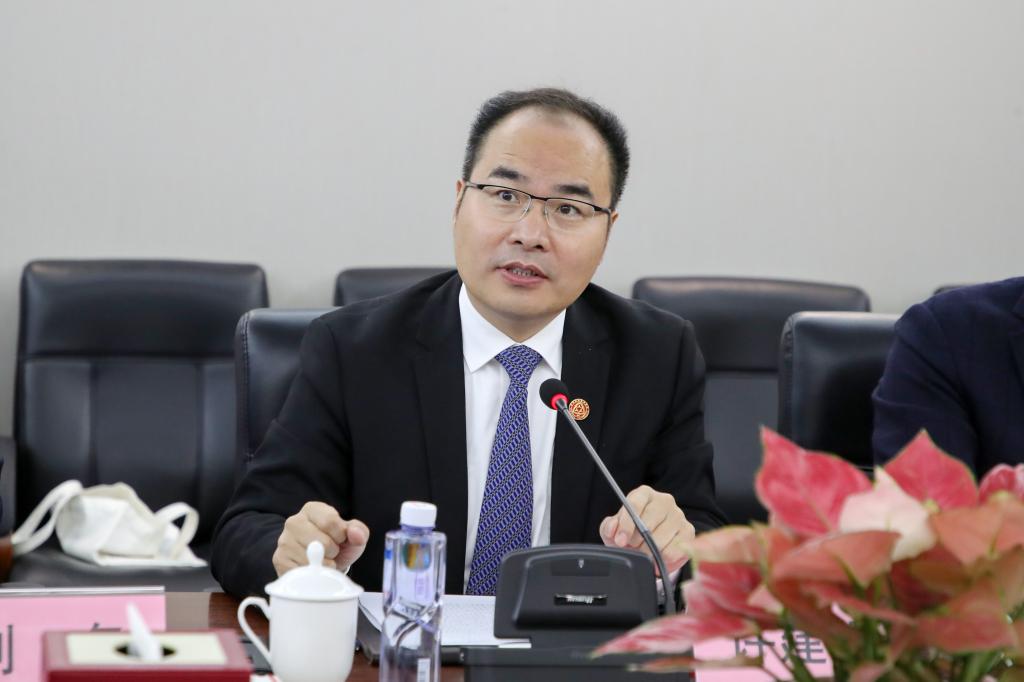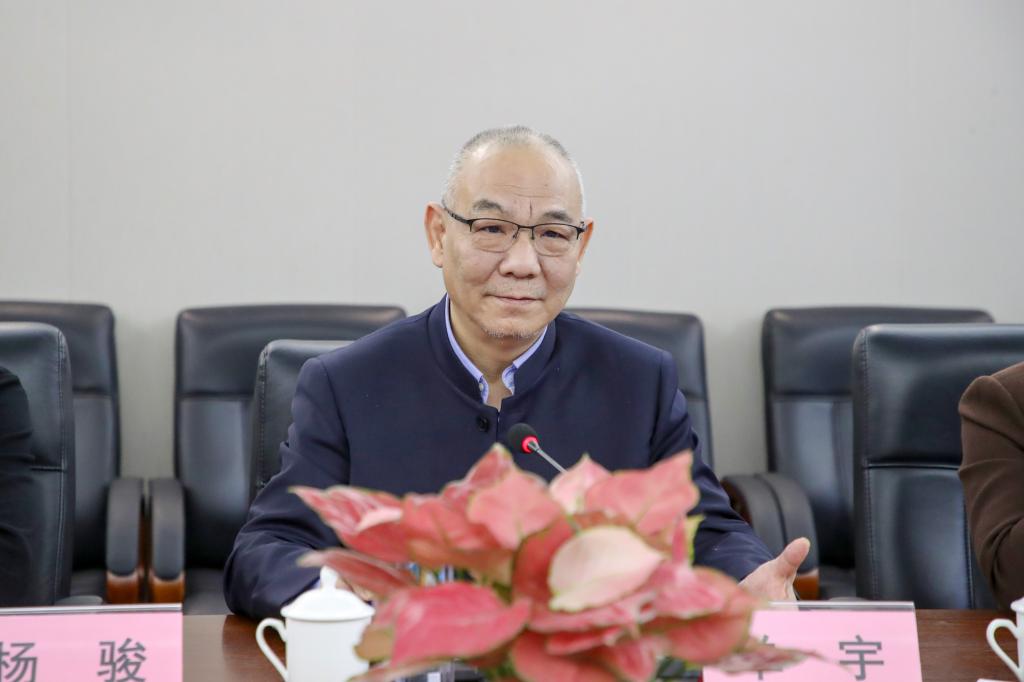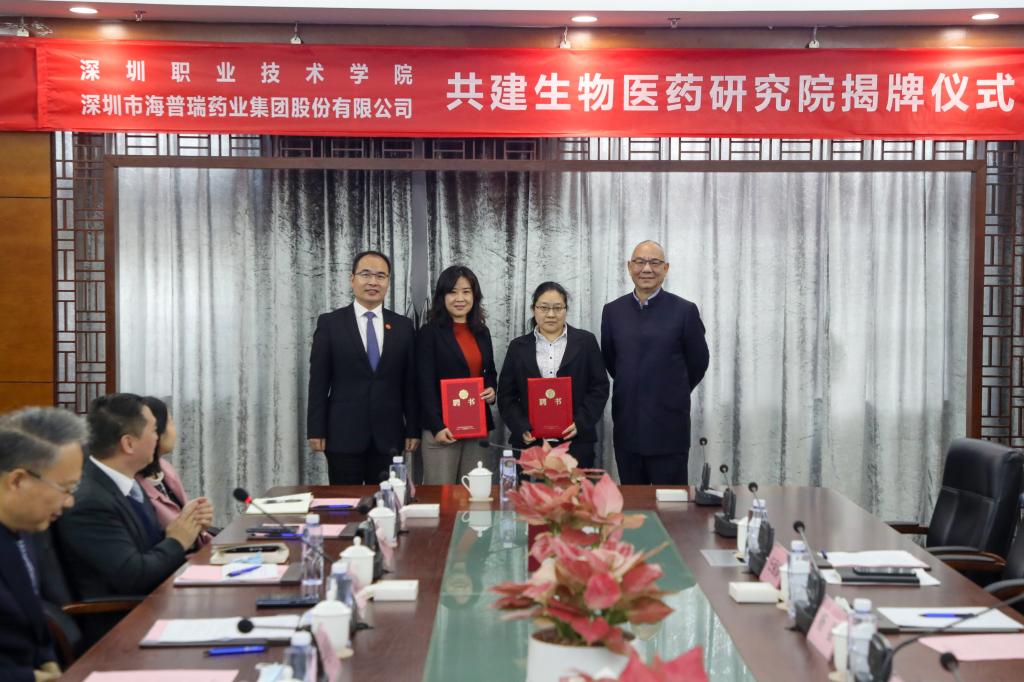
The inauguration ceremony is held in Conference Room 2, Mingde Building, Liuxiandong Campus.
On the morning of December 31, the opening ceremony of the Biomedical Research Institute jointly established by Shenzhen Polytechnic and Shenzhen Hepalink Pharmaceutical Group Co., Ltd. (Hepalink) was held in Conference Room 2, Tongde Building, Liuxiandong Campus. The event was attended by Hepalink's Vice Presidents Shan Yu and Zhang Jie, Director of Technology Real Estate Division Yang Jun, and principal of self-developed innovative drugs Ren Lige and Shenzhen Polytechnic's President Xu Jianling. Dong Chaojun, Vice President of Shenzhen Polytechnic, presided over the ceremony.

Xu Jianling expresses his willingness to work with Hepalink to create a model of domestic university-enterprise cooperation in TVET for biomedicine.
Xu Jianling said biomedicine is an emerging industry of strategic significance in Shenzhen, and China has become the world's largest emerging market in the pharmaceutical industry and has maintained sustained growth. Meanwhile, there is a huge shortage of talent needed by innovative biomedical enterprises. The establishment of the Institute of Biological Medicine is a concrete move for Shenzhen Polytechnic and Hepalink to deepen their cooperation through Hepalink Biomedical Science School and also marks the entry into a new stage of their cooperation. Xu hoped that the institute will effectively pool both parties' superior resources, strengthen R&D of applied technologies, facilitate the construction of the high-level biology and medicine discipline, jointly set a domestic paradigm for university-enterprise cooperation in technical and vocational education and training (TVET) of biomedicine, and ultimately provide talent and intelligence for the development of the biomedical industry in Guangdong-Hong Kong-Macao Greater Bay Area.

Shan Yu says the cooperation between Shenzhen Polytechnic and Hepalink is significant to facilitate talent training and industrial development and benefit human life and health.
Shan Yu said, China has seen rapid growth in the biomedical industry and is marching forward to the power of original drugs. Shenzhen Polytechnic is the bellwether of higher vocational education and the TVET flag in China. Hepalink would like to spare no effort to work with the educational expert on the establishment of the institute. The institute established by both parties aims at the frontier and key areas of biomedicine to continuously widen cooperation scopes. In addition, with a broader vision and mind, both parties will be committed to improving capabilities in R&D and production of innovative drugs, which is significant to facilitate talent training and industrial development and benefit human life and health.

Leaders grant the letter of appointment to institute presidents.
At the ceremony, Xu Jianling and Shan Yu, on behalf of both parties, granted the letter of appointment to Sun Haiyan, head of Guangdong Marine Medicine Production and Education Integration Innovation Platform, and Ren Lige, head of independently developed innovative drugs.
Sun said, she will work with the Hepalink research team on the institute's development plans and research project layout, the application for science and technology projects, and joint research. In addition, the institute will provide the services such as new drug R&D, trial production, and commercialization for Hepalink and biomedical enterprises in Shenzhen and the Greater Bay Area, striving to build an influential high-level new drug R&D base and achievement commercialization base.
Ren said, she will work with Shenzhen Polytechnic on the institute's operation, including gathering experienced enterprise experts and engineers in various fields and combining practical experience with the professional teaching system to build the teaching system. Both parties will set up high-level majors, develop courses, foster high-level industry talent, and eventually develop the institute into an incubation platform for new products and technologies to promote efficient commercialization of R&D results.
The institute will pool resources from the Guangdong Marine Medicine Production and Education Integration Innovation Platform under the School of Food and Drug of Shenzhen Polytechnic, Shenzhen Key Laboratory of Fermentation Refinement Test, Shenzhen Public Technological Center for Large-scale Cell Culture, Shenzhen Biochemical Analysis and Testing Center, the Institute of Marine Biomedicine, and Hepalink to focus on such research directions as the discovery of new drug targets, exploration of natural active components, chemical and biological synthesis of lead compounds, pharmacoactivity screening, multi-omics analysis, pharmacokinetics, key pharmaceutical technology, and drug evaluation, almost covering the full chain of drug R&D and innovation.
(Text by Feng Jinjun, School of Food and Drug; Photos by Jian Jiayu, Publicity Department)
